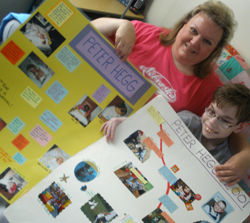 |
Lissa Hegg joined UNMC’s Project DOCC three years ago as an outlet for parents of children with disabilities to teach pediatric residents. She often uses story boards like the ones pictured to illustrate her son Peter’s story. |
Hegg is the around the clock caregiver for her 12-year-old son, Peter, who was born with septo optic dysplasia, a syndrome characterized by the absence of part of the brain and an underdeveloped optic nerve.
Peter was a micro preemie and spent four months in the neonatal intensive care unit before he could join his dad and two older sisters at their Omaha home.
Numerous visits to the doctor followed. Hegg often felt the physicians didn’t understand what it was like to raise a child with a chronic illness.
“Parents are the constants in their children’s lives, so we deserve respect as partners in the health care system,” Hegg said. “Some physicians didn’t know how to communicate with us and didn’t realize how having a child with a disability affected our whole family.”
Finding Project DOCC
Eager to share her knowledge of what it was like, Hegg found her outlet in Project DOCC (Delivery of Chronic Care), a national, parent-run education program for pediatrics residents, three years ago.
Project DOCC was founded in 1994 by the three mothers of children with disabilities for the same reasons Hegg experienced. UNMC implemented the family-centered curriculum in 2004.
With stipends from the department of pediatrics, parents educate pediatric residents who rotate through the developmental medicine department at UNMC’s Munroe-Meyer Institute by opening up their homes and their hearts.
The curriculum
Residents complete a structured interview with a parent of a child with a disability in which questions about pregnancy, marriage, finances and spirituality are not off the table. They also go on a home visit.
Seeing the stack of insurance papers, feeding equipment and bathroom and bedroom conversions helps residents fully grasp what life is like for the parent of a child with a disability.
“After the home visit, many of the residents’ eyes are opened and they see medicine much differently,” said Howard Needelman, M.D., a physician in the developmental medicine department and faculty adviser for Project DOCC. “They find out what parents really want and need is a physician who understands what their environment is like.
An experience unlike any other
“Project DOCC uniquely engages our residents in developing a broader understanding of the impact of chronic medical issues on children and their families,” said John Sparks, M.D., professor and chairman of the department of pediatrics.
For some residents, it may be the only encounter they have with a child with disabilities while in medical school.
|
|
“I have better insight now because I understand how medical issues can affect the entire family,” she said. “What I found most surprising were the sacrifices the two women I interviewed made for their children. They devote every ounce of their energy and time to caring for their children and advocate for other children with similar challenges. I was inspired by their profound love for their children and devotion to all children with special needs.”
In addition to the interview and home visit, the Project DOCC curriculum also includes a grand rounds on delivery of chronic care and an annual parent leader’s conference for pediatric and family practice residents.
Expanding beyond physicians
Dr. Needelman and Hegg would like to expand the program to include doctoral level students in other health-related disciplines and not just limit it to physicians.
To do so, Hegg would like at least eight more parents of children with disabilities to join the group of 13. The only requirement to participate is that a parent must be two to three years out from a child’s diagnosis.
“Life with a child with a disability can be hard to talk about at times,” Hegg said. “There are days when you grieve all over again and can’t talk about anything without shedding a tear. At the same time, talking about it offers a chance to reflect about how far you’ve come. Participating can be really fulfilling and empowering.”
Contact Hegg to learn more.